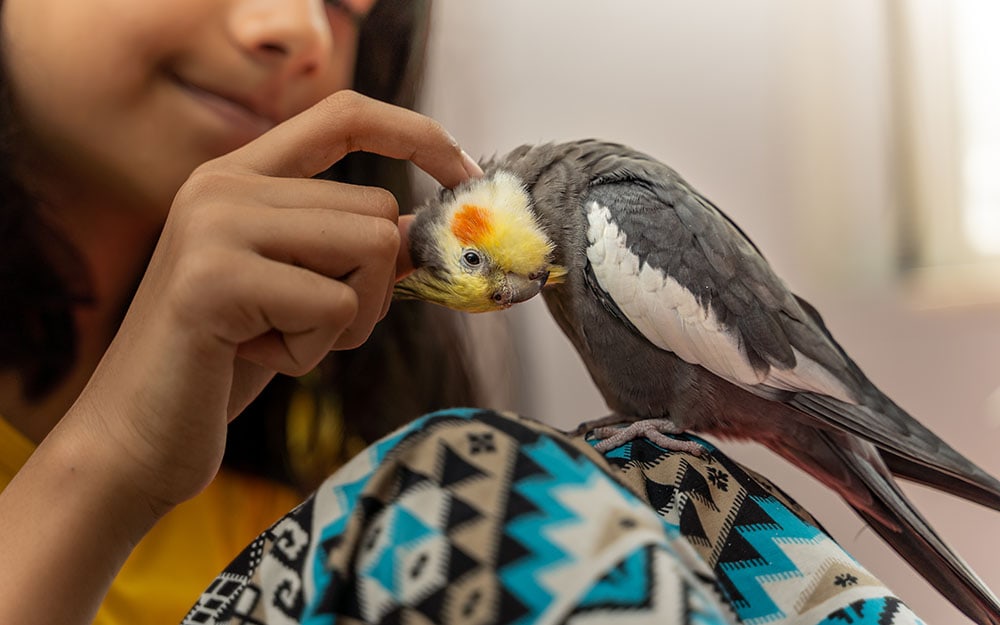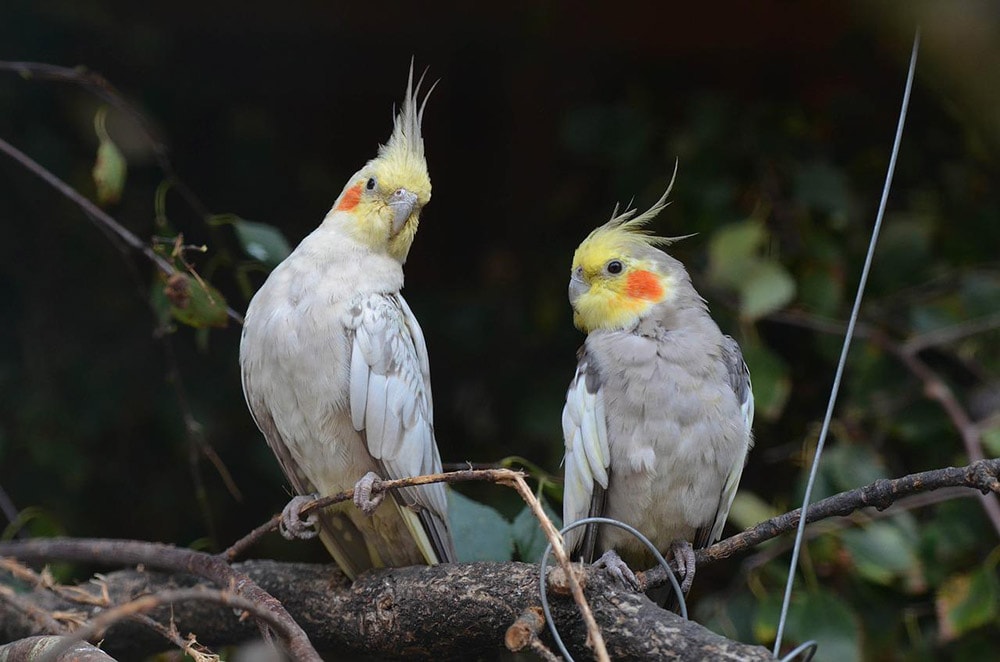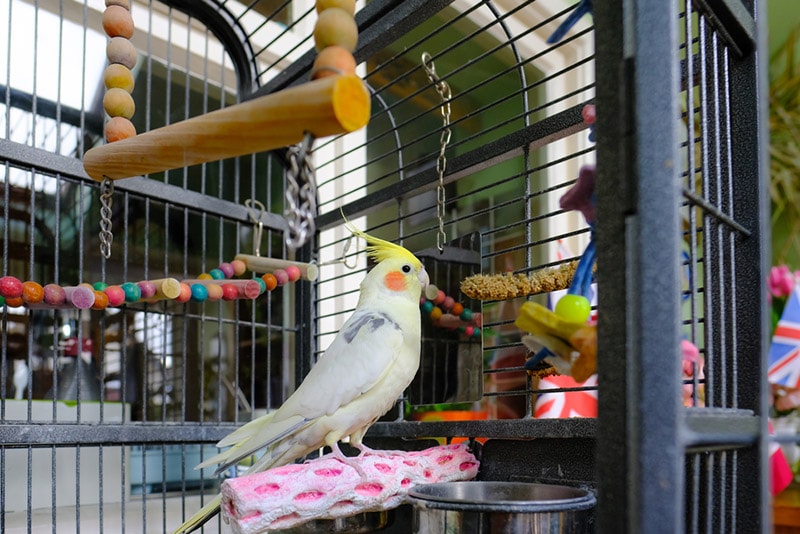16 Cockatiel Pros & Cons You Should Know About

Updated on
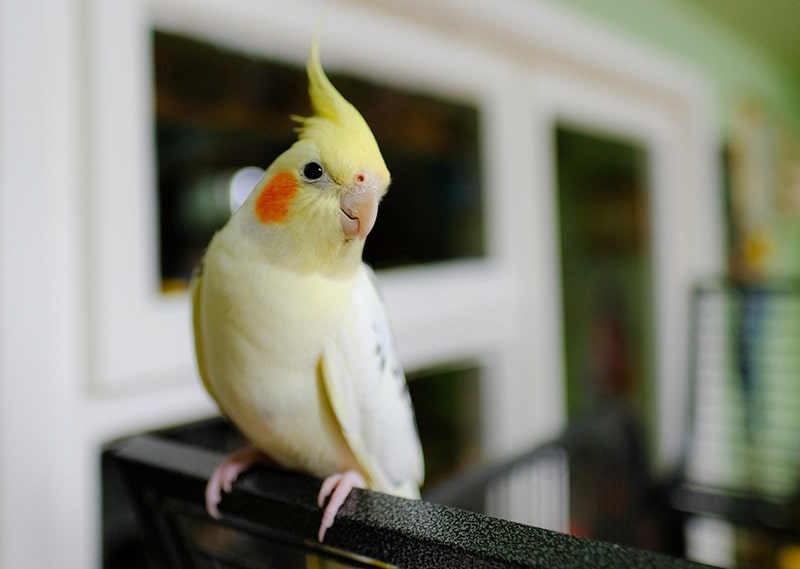
Click to Skip Ahead
Cockatiels are considered good first-time pets, as well as good first-time birds. They are relatively low maintenance, rarely show aggression, and are intelligent and friendly enough that they can be trained and be sociable and friendly. However, they aren’t ideal pets for everybody. The cage takes up room, they need free time out of their cage every day, and they can be quite demanding. They do make good pets, but not for everybody.
So, below, we look at pros and cons of cockatiels so that you can determine whether it is the right pet for you.
The 8 Pros of Cockatiels
1. They’re Inexpensive
African Grays and Macaws can cost several hundred to several thousand dollars. Cockatiels are generally available for less than $100. Their food is also relatively inexpensive, and it keeps for a long time, so you can buy in bulk to enjoy cheaper prices. If you’re looking for an affordable introduction to keeping birds as pets, Cockatiels are a good option.
2. They Have a Decent Lifespan
While Parakeets like 10 years at the most, and Finches only 5 years, Cockatiels can live up to 20 years, which means you won’t become attached to a Cockatiel’s playful character and cheerful whistling, just to have to say goodbye.
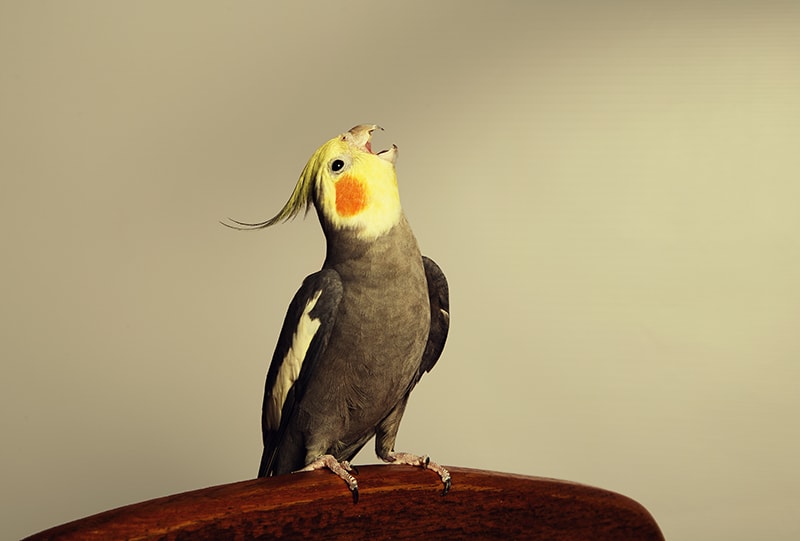
3. They’re Small
Compared to large Parrot species, Cockatiels are small, although they do require quite a lot of cage space. Typically, including the length of the tail, a Cockatiel will grow to at least 12 inches and may even reach 14 inches long. You can expect an adult Cockatiel to weigh around 100 grams. The cage you provide your Cockatiel will need to be approximately 2 x 2 x 2 feet to ensure it has enough room to move and fly around, although it will get a lot of its exercise outside the cage.
4. Cockatiels Are Rarely Aggressive
Although it does depend on the individual, Cockatiels are not usually aggressive birds. This is good news for owners because it means the birds can be handled without too much fear of being bitten or attacked. It also means that they can do well with other passive birds. Even if the Cockatiel does bite, the shape of its beak means that it doesn’t usually hurt.
5. Cockatiels Are Fun
They are considered fun and playful little birds, which means they will keep you entertained. It also means that you will need to provide toys and other forms of enrichment in their living environment, though. Ladders, mirrors, and hanging toys are popular with this species.

6. They Can Be Hand Tamed
Their friendly, fun, and inquisitive nature means that Cockatiels can be tamed and they will readily take to being handled, as long as you start early. When you get a new Cockatiel, allow it some time to settle into its new cage but don’t wait too long before letting it out and encouraging it to perch on your fingers or your shoulder.
7. Cockatiels Aren’t Too Loud
Some Parrots and other bird species can be very loud. Fortunately, while the Cockatiel will squawk and occasionally might screech, it doesn’t tend to be offensively loud. This makes it a good pet for any type of house. It shouldn’t annoy the neighbors, even if you live in an apartment in close proximity to the people next door.
8. Their Poop Is Small
Bird poop isn’t pleasant. It has a hard center and a liquid exterior, and it is difficult to train birds not to poop while out of the cage. This means that you will have to undertake some poop clearing when you own a pet bird. Cockatiel poop is relatively small when compared to the poop of larger breeds.
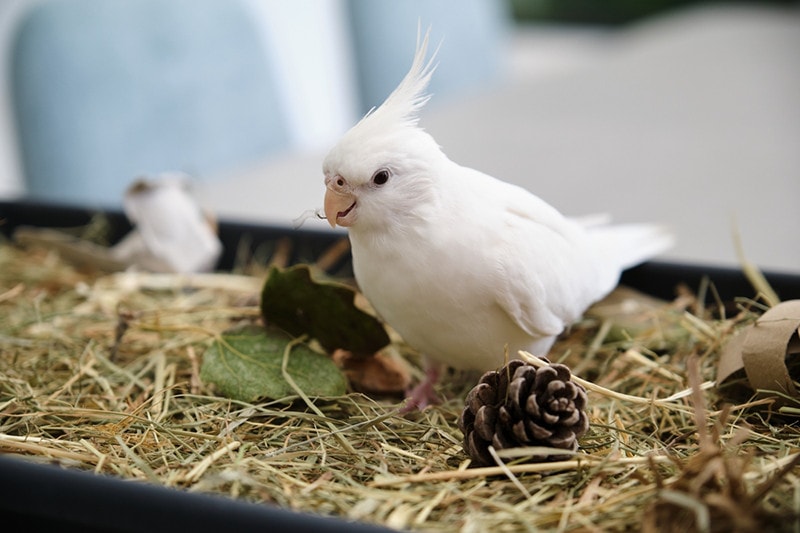
The 8 Cons of Cockatiels
1. A Long Lifespan Means Long-Term Commitment
Having a bird with a long lifespan is great for building a bond between you, but it does mean that you need to consider your long-term future and whether you can reasonably keep a bird that will potentially live 20 years. If you’re at college, for example, and don’t know where you will be living in a couple of years, a Cockatiel might not be the best bird option for you.
2. It Is a Daily Commitment
Another reason that owners build good relationships with Cockatiels is that they are friendly birds that enjoy human companionship. This, too, has its drawbacks. Your Cockatiel won’t just tolerate spending time with you, it will come to need that time. A lonely Cockatiel can become depressed and might even get ill.
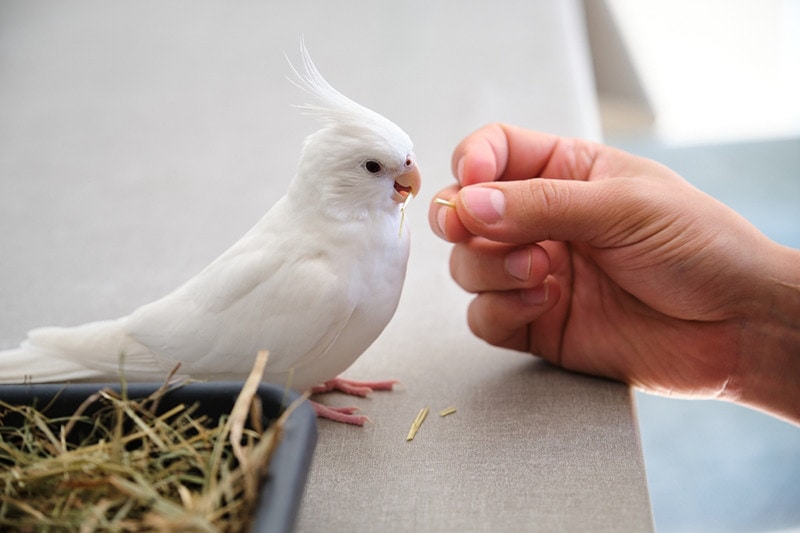
3. Cockatiels Need Regular Handling
To ensure that your Cockatiel is happy being handled and enjoys spending time with you, you will need to ensure regular handling from a young age. Ideally, start handling a young Cockatiel from the age of around 10 weeks. Initially, handle the bird for a few minutes a day and allow it time out of its cage every day. Over time, you can increase the amount the bird is handled.
4. They’re Dusty
A lot of species of birds give off dust. It is the keratin coating that protects their wings and is shed when they preen, flap, or rub their feathers. Cockatiels are not as dusty as some of the bigger birds, but they do produce some dust so you will need to clean up regularly.
5. You Will Need to Clean Up Poop
While Cockatiel poop is comparatively smaller than the poop of a lot of parrots, it is still messy, and it will still need clearing up. Birds will poop whenever they need to, and this won’t be restricted to when they’re in their cage or a particular area. This means that you will find puddles and patches of poop that need clearing. And while the small size of the poop means you won’t be finding large piles, it can make it more difficult to locate.

6. Cockatiels Can Be Destructive
The fun-loving Cockatiel can become bored and when this happens, it will try to make its own entertainment. To a bored Cockatiel, entertainment can include pulling at curtains, picking up and throwing small items, and flicking its seed and other items from its cage and onto the surrounding floor. Providing plenty of sanctioned toys and enrichment can help reduce mess-making, but there will likely still be some regular mess.
7. They Can Be Noisy
Very rarely do Cockatiels talk, but they do still vocalize. They whistle and imitate some noises, and they can also squawk, screech, and even hiss. They aren’t overly noisy birds, but potential owners should be aware that they can make noise and they will be more inclined to do so if they are bored, depressed, or feeling anxious or scared.
8. Cockatiels Can Be Sensitive
They can be quite sensitive birds, especially at nighttime when it isn’t uncommon for Cockatiels to wake up screeching and flapping their wings. They are somewhat sensitive to change, and they may not take well to new people or new situations. Some can struggle if they are placed in a busy home with lots of people and other animals coming in and out.
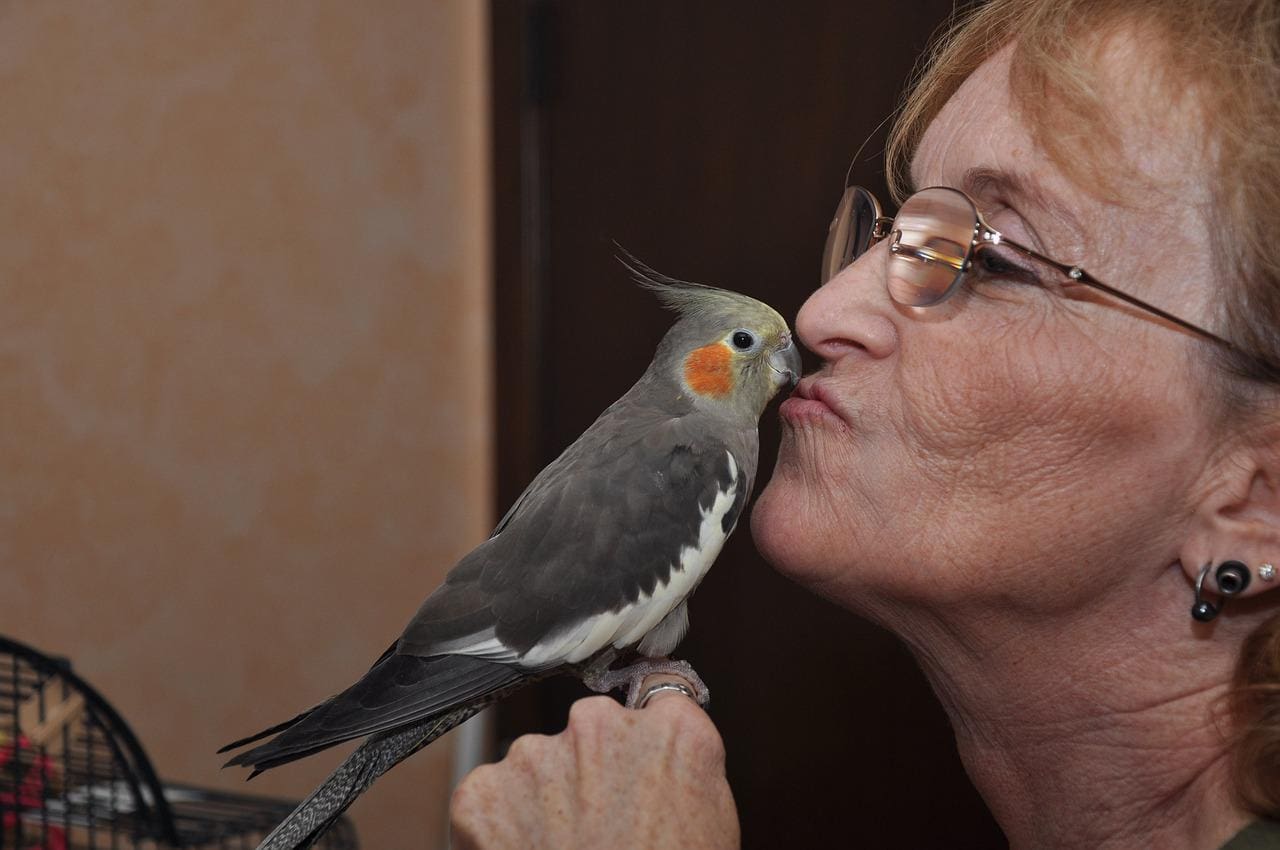
Conclusion
Cockatiels can make great pets, but they aren’t ideal for all owners. They are fun, lively, and typically enjoy human company. They are also sensitive to noise, can get bored, and are dusty and messy. Their long lifespan means that if you get a Cockatiel and it isn’t the ideal bird for you, you may have to live with it for up to 20 years.
Related Read:
Featured Image Credit: Nick Beer, Shutterstock

